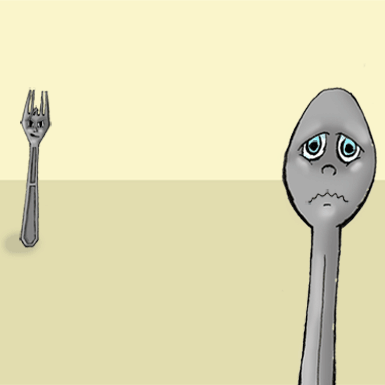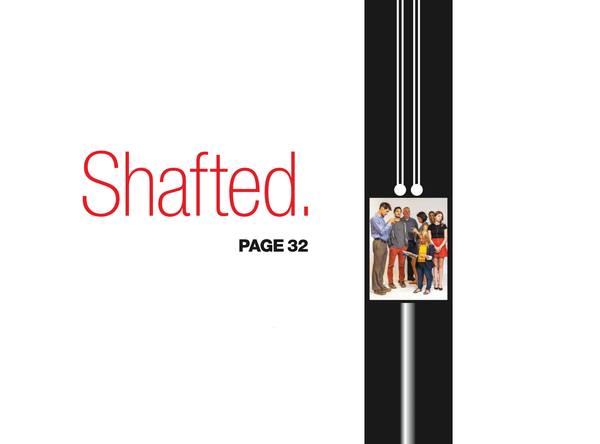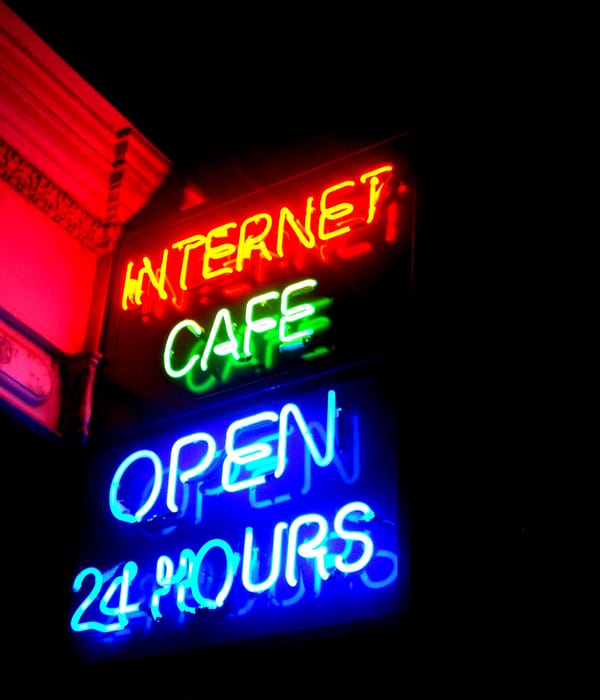Tiny Desk Salad: 9 things people told me about digital discontent for you to ponder alone at lunch
This week the category is, reclaim your lunch! To mark ESC KEY .CO’s first Q1.3, we’re packaging nine crunchy-fresh ideas about our digital discontent into a big mental meal plan. But first, we present a monologue about the aspirational lunching lifestyle. It may be our most unhinged long-read yet.

Act I. The state of lunch: An unhinged Q1.3 salad monologue
Tiny Desk Salad is not a production of NPR, nor does Tiny Desk Salad have any relationship with NPR Music’s Tiny Desk Concerts. To be honest, I don’t know if I’m legally obliged to tell you that. I am simply trying to, ahem, elevate this lonely dish of greens sitting here by my keyboard. A question I’ve been asking myself a lot this year is, how can I inspire anyone to have more intellectually fulfilling lunches if I am, indeed, a lunch con artist?
As you may know too well, dear reader, every week at ESC KEY .CO one part of my mission is to give you “something worth discussing over your next power lunch.” I write that with a knowing wink, sure. But there’s earnestness there, too. And yet, more than three months into this operation, I need to make a sincere confession: I feel like I’m a lunch fraud! Imposter lunch syndrome, if you will! Here I am a few forkfuls into spring mix — alone! Power lunch?! It’s a complicated business!
Just as some Tiny Desk Concerts live on a loop in my mind whenever I feel a little wistfully nostalgic — such as The Cranberries’ hauntingly perfect 2012 desk-side performance — the same is true for the interviews that I’ve conducted since mid-January's soft launch of ESC KEY .CO. When I’m hustling alone at my desk, unfocused and staring off into the distance, I think back on these stimulating conversations, a fantasy group lunch I’m not having but could be in theory: Ergo, I term that disconnect — between this Tiny Desk Salad and the fantasy Power Lunch — the Great Lunch Gap.
Imagine a power lunch combining brilliant chats with the likes of Karen Hao (co-lead on the Pulitzer Center’s “AI Spotlight Series”), Oliver Haimson (author of the MIT Press open-access book “Trans Technologies”), the Internet Archive’s Chris Freeland and many more. All at one table. Aspirational lunch dates. I sit alone, dreaming.
For journalists, interviews with sources like these are kind of like our own private Tiny Desk lecture series. You slouch over the little desk in a humid, sauna-like phone booth. You close the little door. You join a remote video call with smart people, big names, total baddies. They share their expertise, their life work, their quotable one-liners. Then the call ends.
You hear things so interesting you want to tell your friends over lunch. But here I am not making enough time in my own life for the long, chatty lunches I preach about?! (This is a note to self to schedule that lunch with that friend you've been meaning to text back.)
Indeed, we live in an era of digital discontent; productivity porn; over-optimizing every area of our lives to such a great degree that a lazy, carb-y, maybe bottle-of-something-fueled lunch with pals can sometimes feel like a rare luxury.
If work keeps you online, it can feel like you’re never off. You’re picking at baby spinach at your desk to get ahead on that Q2 thing. But you're not ahead. Sure, you might’ve recently completed The Guardian’s “reclaim your brain” five-week phone detox newsletter series, which is depressingly insightful. You are clearly concerned with your screen time but have struggled to lower it because you’re addicted to refreshing your inbox, your Slack threads, your dating apps because who isn’t a little lonely right now? As a result, you feel a little over-extended, over-worked, over being alone.
Look, sometimes the hustle is worth it. I reject doomerism. Time online can be rewarding, too. Parrot videos on TikTok are cute. The internet, as bad as the vibes are right now, can still be a place for independent voices to find an audience and for us to hang out in some federated server with cool pals we might not have met in person (you know who you are). It is worth it when it’s in service of something substantive and fun. The key isn’t necessarily moving to an off-the-grid, wind-powered castle in the Scottish Highlands (though it might be). It’s to Embrace Skeptical Curiosity (equals ESC). And it's to find repeatable ways to Keep Enjoying Yourself (equals KEY). (Wow!)
For instance, maybe you’ve recently launched a new media outlet and you’re truly enjoying it. In fact, maybe you’ve published more than 75,000 words you wrote (and republished 12,000 words by the late Paul Lafargue).
And even so, maybe it’s cutting into your social life a tad more than you’d like to admit? When you’re the Chief Editorial Officer and a team of one, whose fault is that, really? No, you are not solely responsible for the macro-economic forces that make work feel precarious and a social lunch feel impossible. But you also have some agency.
There’s only one lunch a day. Lunch won’t make time for you unless you make time for it. The sick irony is that abandoning life’s small pleasures, your “monk mode,” your “raw-dogging,” your glorification of the time you invest in skipping nourishing lunches doesn’t even make you more productive.
Reclaiming your brain is a good idea. It’s also hard. Maybe one place we can start is reclaiming our lunch?

That friend waiting on a response from JD interrupts this Q1.3 report on reclaiming lunch: “Come to lunch with me, JD?!”
Immense guilt settles in and JD’s voice cracks: Oh, sorry, I really want to lunch but I need to write my newsletter today, the next one is, um, about the importance of lunching!
“Who cares? Who reads? Why are you working so much on this newsletter?! Wasn’t the title of Katherine Cross’s book ‘Log Off,’ anyway?! Didn’t you call it ‘almost prophetic, hands-down the smartest book I’ve read about social media so far this decade’? Have you tried logging off?!”
JD snaps. They’ve not been sleeping enough: Who, um, reads?! Really?!! WELL IF YOU’D HAVE READ THE VERY LONG ABOUT PAGE, IT’S A NEWSLETTER FOR VERY ONLINE PEOPLE WHO VERY MUCH WANT TO BE OFFLINE BUT OFTEN FEEL LIKE WE CANNOT!
“JD, calm down. It was a joke. Why the all-caps? Another absurd series of acronyms?! You’re lunching solo. I am merely your nagging conscience.”
Oh. Always connected. Seemingly more alone than ever. But with choices I can make.
Taking time for an intellectually stimulating lunch is clearly not the whole solution, but guarding your lunch break is one thing you can do to inject a little life into your days. For instance, during recent solo luncheons, I’ve tried to make an effort to sit outside in the sunny mid-spring courtyard at Somerset House, where ESC KEY .CO is based, reading a few pages of something fresh.
But even when I’m eating at my desk, I give myself a few minutes to let my mind wander and connect the dots in my first quarter of reporting for this site.
With ESC KEY .CO so far, it feels like we’ve convened a salon with smart, interesting people of different lived experiences and disciplines, yet all grappling with overlapping questions about the state of our digital discontent. The themes that emerge give us a mental map for navigating our moment, dare I say a mental meal plan for those lunches at our desks when we’re fated to eat alone.
Yes, lunch is a verb. Lunch with friends when you can. But feed your brain when you can’t. The point being, you can change your lunch if you want to. It might not be easy, perfect or your power lunch fantasy. But it can be a little better. By now, you can see that lunch is a metaphor.

Act II. The mental meal plan for your next 9 solo lunches
To mark ESC KEY .CO’s Q1.3, I present nine compelling things I learned this quarter from smart people. These are nine things I keep thinking about when I’m eating alone at my desk. I refuse to call this food for thought. That would be obvious. And, ultimately, we are gathered here today to Challenge the Obvious (equals .CO).

1. Karen Hao: “AI” has been a marketing term since it was coined
When award-winning investigative reporter Karen Hao traces the origin story of artificial intelligence, she begins with a remarkably candid admission from the guy who coined that term. “I invented the term artificial intelligence,” John McCarthy blurted out during a 1973 BBC debate. “I invented it because we had to do something to get money for a summer study.” As the Royal Institution audience erupted in laughter, McCarthy had unwittingly revealed back then what Hao would later tell ESC KEY .CO in March: “AI” has always been, first and foremost, a marketing term.
This origin story reveals why today's “AI” discourse feels so slippery. “Over the decades since the original idea was conceived and the term was coined in the 1950s, there’s just been many different iterations of what the technology actually looks like and how it works,” Hao explains. The contemporary debate isn’t only scientific but “a business debate, a political debate, an economic debate” shaped by corporate and state actors with “very self-interested agendas.”
“It's really hard to understand which tech you're talking about when you use the term AI.”
Hao’s forthcoming book, “Empire of AI” (pre-order here, out on May 20), traces the impacts of the tech across continents. She reveals how today's “AI” economy — from engineers in Silicon Valley to data laborers in Africa to water activists in South America — recreates familiar patterns of extraction.
Speaking with us about her work co-leading the Pulitzer Center’s AI Spotlight Series, which trains journalists worldwide on covering “AI” as a political and economic story, Hao shared a framework for curious readers to cut through the hype. One big red flag? Using ‘AI” as a catch-all term. “There are many different types of AI technologies, and it's really hard to understand which technology you're talking about when you just use the term AI,” she explained.
This vague terminology obscures critical distinctions between vastly different systems with dramatically different impacts. Instead of viewing technologies as disembodied intelligence in some formless “cloud,” Hao urges us to see them as products that cause human rights and environmental impacts throughout their supply chains. That is where we can begin to de-hype the discourse in our fields. (See Hao's top red and green flags for reading about the tech in this Power Tools bookmarkable guide.)

2. Oliver Haimson: Transing technology and urgently centering community needs
“I study technology to learn more about transness, and trans identity to understand more about technology,” Oliver Haimson told ESC KEY .CO in February, encapsulating the revolutionary approach found in his groundbreaking book “Trans Technologies” from MIT Press.
At a moment when fascist currents threaten marginalized communities, Haimson's research — interviewing more than 100 trans tech creators in a single year — reveals a thriving ecosystem of resistance through design. From voice training apps to healthcare directories to mutual aid platforms, these technologies aren’t mere adaptations of mainstream tools but fundamental reimaginings of what technology can be.
Haimson’s work illuminates a radical proposition: that those most marginalized by mainstream tech might hold the most helpful insights on fixing what’s broken. When I asked him about this apparent irony, he offered a vision for “transing” technology that reaches far: “In transing tech, the way I'm conceptualizing it, we’re trying to turn technology into something new and different that works for people who have complex identities, people whose identities are changing. And that's not only trans people — that’s everybody.”
“I study tech to learn more about transness, and trans identity to understand more about tech.”
The book introduces a concept he terms “plasticity” to describe technologies designed for complexity, transition and transformation. Such trans technologies embrace the fundamental reality that identities shift and evolve.
As government attacks on trans rights continue to intensify in the United States, United Kingdom and beyond, Haimson sees technology playing an increasingly vital role in community survival (and, also important, joy). In an industry shaped by corporate surveillance and algorithmic oppression, “Trans Technologies” offers a roadmap to something profoundly different: anti-fascist technology built from the ground up to center community needs rather than extractive profit models. (We unpack a few examples in the extra long read, alongside a deep conversation with Haimson.)

3. Katherine Cross: “Log Off” and the collective illusion of activism on social media
“There have been plenty of ‘social media is bad’ takes, but in ‘Log Off’ you have a more original and urgent message,” I told Katherine Cross in our long-form interview in January, referencing her incisive book “Log Off: Why Posting and Politics (Almost) Never Mix” from LittlePuss Press. Her response cuts to the core of social media's fundamental deception: the platforms trick us into believing we’re participating in meaningful collective action when we’re mostly just creating content.
She speaks from experience: “I had to realize something about my own hopeful online agitations from the last ten years,” she confessed. “The main beneficiary of a lot of that online activism was me. I became microfamous. I got work. I met interesting people. But I really didn’t contribute to moving the needle on anything by posting.” For that, she had to log off.
This insight becomes particularly resonant in the aftermath of an election where a digital hype bubble suggested to some an entirely different outcome than what materialized.
“Memes don't vote.”
Cross told me she saw the surge of enthusiasm for Harris, from coconut memes to "kamala IS brat" tweets, and momentarily felt her older hopes return. “What if I was wrong? What if this really was an organic surge of energy that portended a tidal wave?" But her instincts proved correct. “Memes don't vote,” she said bluntly.
Cross’s analysis explains why: social media excels at creating individual catharsis but fails at building “any kind of ground-up organization that can, itself, reorganize society for the better.”
Even the promise of decentralized social platforms — the “fediverse” that many leftist netizens fled to following Elon Musk’s Twitter takeover – doesn’t escape Cross’s critical eye. While there are obvious benefits of open protocols like those powering Bluesky (AT Protocol) or Mastodon (ActivityPub), Cross suggests we should remain skeptical about their potential for changing our communities and our politics for the better.
A more open technical architecture doesn’t solve the fundamental problem: social media platforms, regardless of their ownership model, excel at destroying things but struggle to build them. (On the other hand, she acknowledges social media is good for jokes!) During our conversation, she recalled joining a “wonderful little server of trans women” on Mastodon that soon “collapsed in drama,” leading her to conclude, “yeah, this is not the promised land.” As Cross puts it, social media tricks us into thinking we’re achieving something political when the real work of change requires us to, again, log off. (More nuance and nudges to focus your efforts on your community in the extra long read, with the full Cross interview.)

4. Chris Freeland: Digital archivists as democracy’s backup drive
“Recent events have made it painfully clear how fragile our digital history is. From government data disappearing overnight to entire sites vanishing, we’re seeing critical records scrubbed from the live web in real time,” Chris Freeland, director of library services at the Internet Archive, told ESC KEY .CO in early February amid reports of the new U.S. administration's aggressive purge of government websites.
As federal agencies deleted more than 8,000 pages within days — scrubbing climate science research, erasing marginalized communities from federal records and even removing the word “diverse” from non-DEI related descriptions of museum collections — digital archivists had already been working tirelessly. But now they work with a heightened sense of urgency.
“Recent events have made it painfully clear how fragile our digital history is.”
The Internet Archive’s Wayback Machine has emerged as an essential tool for accountability journalism in this new era of censorship. When The Washington Post investigated the strategic alterations across federal websites, they relied on the Archive’s digital snapshots to document the changes. Meanwhile, the End of Term Web Archive project — a collaboration between the Internet Archive, Library of Congress, Stanford University Libraries and other institutions — preserved hundreds of terabytes of government data during the presidential transition.
These archivists, often underfunded and working in obscurity, have built the infrastructure to preserve truth itself when authoritarians attempt to rewrite reality with a keystroke.
“Archiving the web isn't just about nostalgia,” Freeland emphasized. “It's about ensuring that future generations have access to the data, stories and perspectives that shape our world today.” When the Internet Archive briefly went dark after a coordinated DDoS attack in October, it offered a chilling preview of our possible future: a digital dark age where power means the ability to press delete on any inconvenient fact.

5. Alice Crossley: When algorithms ordain the group tour guides
During her 2023 backpacking trip through Central America, Alice Crossley, senior foresight analyst at The Future Laboratory in London, noticed something curious: ordinary TikTokers were rapidly transforming from random travelers into recognized personalities simply by documenting their journeys.
“They quickly became known amongst everyone traveling a similar route to them,” she told ESC KEY .CO about one content-creating pair in our first original reported feature. “They would mention in their videos how often they were recognized by fellow travelers.”
This swift algorithmic coronation unlocked a curious new career path — these creators soon began organizing group trips, taking followers to their favorite destinations. The platform’s algorithm was functioning as an unlikely A&R department for the travel industry, minting new tour guides through engagement metrics.
This phenomenon revealed what Crossley termed “hyper-relatable digital collectives” — influence built on a new iteration of parasocial intimacy. “Through watching the creator's TikToks, the traveler has a parasocial intimacy with the creator, which makes them feel more comfortable joining a group of strangers for a trip to the other side of the world,” she explained.
This comfort with virtual strangers is especially meaningful in our post-pandemic context, where many young people lost coming-of-age years to lockdowns. As Crossley observed, some internet strangers saw group travel with content creators as “the perfect antidote to years of COVID isolation.”
The creator’s feed doubles as a shoppable moodboard, offering not just destinations but potential social connections, creating a flywheel where content begets group travel begets more content — all ordained by algorithms that remain a black box.

6. Andy Crysell: How “offline” became a nightlife #sponcon marketing campaign
Imagine this: you’re at Amsterdam Dance Event 2024, ready to film Scottish DJ Barry Can't Swim’s set, when an invisible infrared message suddenly appears on your phone screen, blocking the camera and advertising an app called The Boring Mode. Welcome to nightlife’s latest revolt against our always-on, always-documenting culture. The surreal twist, of course, is that this digital détournement is itself an advertisement for Heineken. This tension between community and commercialization stands at the heart of Andy Crysell’s fascinating new book, “Selling the Night,” which documents the fraught terrain where underground culture meets corporate cash.
The stakes couldn't be higher. All clubs in the United Kingdom could close by 2030 if nothing changes, according to trade group predictions, with the current rate of venues closing at three per week.
Meanwhile, brands chase cultural relevance through increasingly absurd stunts — who can forget the DJ wearing a massive Colonel Sanders helmet at Miami’s Ultra Music Festival in 2019? As Crysell told ESC KEY .CO recently, “When you look at the creative industries in honesty, it really is about a handful of very large corporations that rule it. The money is not being evenly distributed. It is tending to create very monocultural outputs.”
“Corporatization is tending to create very monocultural outputs.”
One paradox in “Selling the Night” that Crysell maps is how it is now aspirational to be offline — itself almost a false binary in our always-online culture. It is so widely felt that the insight has trickled up to the C-suite, where it is becoming marketing campaigns. Heineken also launched a branded dumbphone, aka The Boring Phone. The desire to escape digital saturation has become both genuine yearning and profitable marketing angle.
Meanwhile, the question threading through the underground in cities like New York and London is, who can afford to resist “selling out” when gentrification and rising costs make throwing parties and running clubs increasingly a rich kid's game?
Yet despite the commercialization pressures, phone bans spreading from Berlin's techno temples to intimate East London bars, and the persistent doom-saying, Crysell maintains qualified optimism: “I wouldn't bet against the appeal of people getting together in a space to dance to some loud music.” (We zoom in and out on the state of nightlife in the long-read.)

7. Tiara Darnell: The philosophy of figuring out what’s next in this creative economy
“I think about all the dreams I had as a teenager — what are the things you wanted when you were unencumbered and the world hadn't completely jaded you yet? Have you actually accomplished those things, or did they get buried somewhere along the way?” This question, posed by Tiara Darnell during our first in the Power Lunch profile series, has haunted me as I’ve forked through a few sad desk salads.
And Darnell should know. At 36, she’s lived several dream lives already: Peace Corps volunteer in Morocco, wine and cannabis pro in Oregon, Spotify producer, and most recently, founder of Blaxicocina, Mexico City’s first Black American soul food restaurant. When I caught up with her, she was in Belo Horizonte, Brazil — yet another reinvention in progress after closing her acclaimed restaurant in December after two hustling years.
“What are the things you wanted when you were unencumbered and the world hadn't completely jaded you?”
The remarkable thing about Darnell isn’t just what she’s accomplished, but the clarity with which she sees the entrepreneurial path many fantasize about. “This idea that entrepreneurship means escaping the nine-to-five is so far from the reality. You’re actually trading your nine-to-five for a twenty-four-seven schedule,” she told me recently.
Her reflections on being an American in Mexico City during its era of overnomadism is particularly timely. “There's this level of privilege that we experience. We're not immigrants like ‘my life has been so hard that I will risk everything to come to this country for a better life,’” she acknowledged.
“To be a Black American in Mexico is to breathe new energy into your life. It feels good to be somewhere where your humanity is acknowledged and you can just be at ease and exist, relatively unburdened, in a way that doesn’t really happen in the U.S. But it’s something I feel deeply conflicted about — we’ve built something special over these last few years especially, but like any immigrant community, we’re making our own bubble.”
Darnell’s particular genius lies in how she’s embracing both achievement and its aftermath – the question that looms when you've ticked off your teenage dreams: now what? (This first in the Power Lunch series resonated with readers, so pull up a chair here.)

8. Mel Anyamene: Building travel collectives beyond the TikTok taste clusters
“There's a lot of stigma around visiting certain places and concerns about how people of color might be treated,” Mel Anyamene, co-founder of Out of Office Collective (OOOC), told ESC KEY .CO when discussing the motivation behind their group travel organization. While many content creators have leveraged algorithmic attention to simply monetize their followings, OOOC represents something more intentional — a response to the marginalization many travelers experience within the mainstream industry.
The collective has evolved beyond typical influence-driven models, focusing on creating secure environments for underserved audiences. “Even if you choose to explore independently during the day, you always have a tribe to return to at the hotel — a tribe where you can feel safe, seen and understood,” Anyamene explained.
“There's a lot of stigma around visiting certain places and concerns about how people of color might be treated.”
What distinguishes OOOC from conventional group travel platforms is its emphasis on community-building rather than just monetization. “I wouldn't exactly say we're a travel agency. I feel like ‘travel agency’ gives the impression of just booking travel for people, when it's more collaborative than that — it’s a co-creation,” Anyamene says.
Their approach emerged directly from audience demand: “Growing my TikTok page has shown me just how many people dream of traveling but feel held back — whether by fear, lack of knowledge or uncertainty about where to start. I frequently get messages from people asking to join me on trips.”
This connection between digital influence and real-world gatherings underscores a broader shift in how communities form in the algorithmic age. Unlike many content creators who stumble into group travel through viral luck, OOOC represents a more deliberate model, using TikTok not just as a promotional channel but as a way “to get things out to people based on what they like” – leveraging the algorithm’s clustering abilities while working toward something more substantial than fleeting digital fame.

9. Paul Lafargue: Behold, the Prophet of Leisure!
OK, full disclosure: I didn't actually speak with Paul Lafargue, given that he wrote “The Right to Be Lazy” from Paris’s Saint-Pélagie Prison in 1883. Yet his voice echoes with unnerving relevance across nearly a century and a half, becoming the first selection in ESC KEY .CO’s newly announced Public Domain Reading Club.
Lafargue’s pamphlet, which we've republished in full, reads like the footnotes to our contemporary discourses on burnout, quiet quitting and yes, “AI-sterity.” His central insight: While machines should in theory make labor easier, Lafargue argues that in practice they're ultimately not really doing that (i.e., the productivity gains don't give you more time off; they increase profitability).
Sure, his focus was on the Second Industrial Revolution. But it is strikingly relevant. As I wrote last week, while Musk tells us “AI” might eliminate the need for jobs entirely, his Department of Government Efficiency slashes federal positions in the name of optimization. The tools change; the power dynamics and the hype remain much the same.
Even if there's no right to be lazy right now, the least we can do is make time for a nice, long, chatty lunch with real-life friends from time to time — so, yeah, text them back, babes!
Act III. This GIF where a diabolical fork makes the spoon quite anxious (we’ve all been spoon!)






